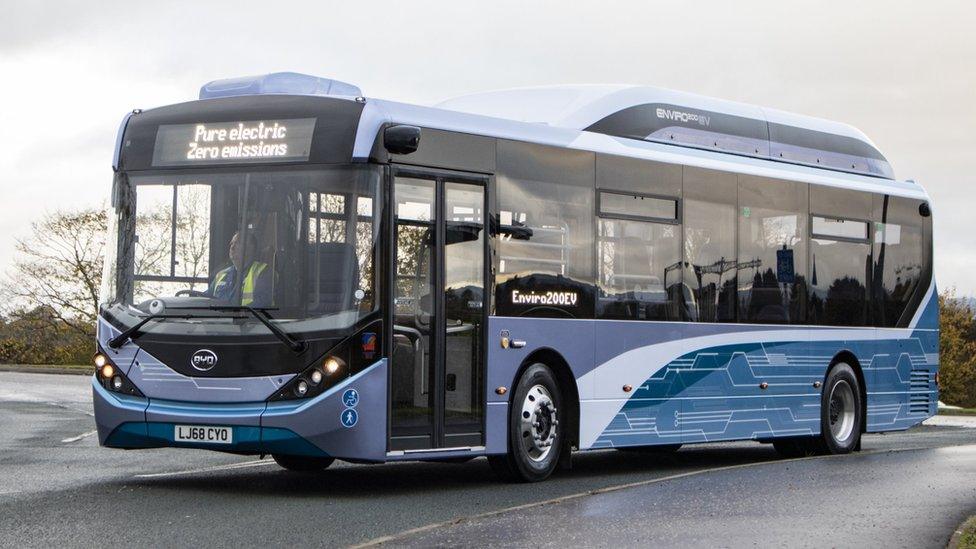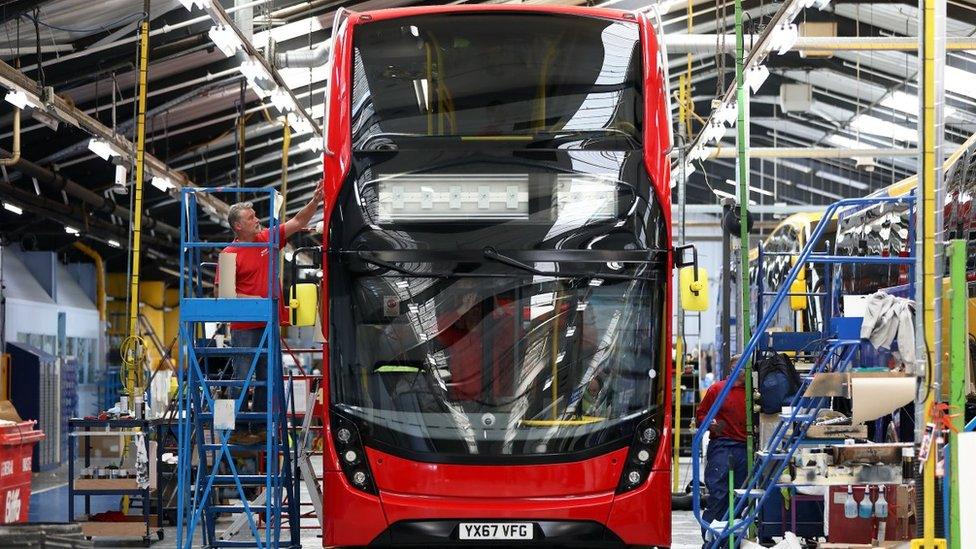Bus builders: hold very tight, please
- Published

The likely loss of more than quarter of the jobs at Alexander Dennis bus-builder in Falkirk is not unexpected, but it's harsh for a company that was doing all the right things until Covid-19 struck.
The firm's boss is asking government for an innovative investment into buying buses by the thousand, possibly to lease them back to operators.
Recessions can usually be expected to weed out the weak. If economics has anything to do with Darwinian behaviour and the survival of the fittest, they are a harsh necessity.
This time looks different. Healthy companies are exposed, where their markets have suddenly disappeared and offer no indication of when demand might return.
That's how it looks for Alexander Dennis Ltd (ADL), the Falkirk-based bus-builder. It was built out of administration 16 years ago, when Scottish knights rode to its rescue with investment - Sir Brian Souter, Sir David Murray and Sir Angus Grossart.
With Colin Robertson as chief executive and the fourth part of that investing quartet, it grew to rank as one of the biggest-employing manufacturing plants in Scotland, recognised as a exporting success to markets as far away as Hawaii and Hong Kong.
It has adapted to the need for more hybrid technology, mixing the Euro 6 diesel engine with battery power. With a specialism in double-deckers, it sells around the world to metro regions that need more efficient use of road space.
It is doing trials on autonomous, driverless buses with Stagecoach, building all-electric buses for London, and moving on to hydrogen-powered vehicles. It's done everything you would want a modern manufacturing business to do, while quadrupling turnover to £630m.
Empting order book
Without the appetite to go on the acquisition trail, the investing knights and Mr Robertson instead sold out, for £320m, to a larger Canadian bus-builder in May last year, with extraordinary good fortune in their timing.
Early this year, Colin Robertson announced he was exiting the chief executive's office, to become non-executive vice-chairman of the parent company, New Flyer Industries (NFI) in Winnipeg. His replacement brings an internal promotion for Paul Davies, recently returned from 20 years running ADL's Asian operation from Hong Kong.
And then Covid-19 hit, upending the market for new buses. At least the operators are being subsidised to continue providing a vital public transport service. But they're not investing in new buses. And the ADL business model, at its recent scale, requires an order book of around 2,500 buses a year.
That's why Colin Robertson has been calling for government intervention - not with a bail-out or subsidy but with a more unconventional proposition, that government becomes a bus-owner, and leases to operators.
Boris Johnson, who got a passion for buses as mayor of London, committed before the pandemic to 4,000 lower-emission buses coming onto the roads.
He reiterated that last month, but it's not yet clear how that happens. And Colin Robertson says he has a plan that fits with the prime minister's ambition.

ADL sells double decker buses to markets around the world
Seventy per cent of buses on British roads are running on old diesel engines, preceding the Euro 6. While operators won't invest, the government could - and replace many of the dirty, older clunkers.
"We're in the best place to build the best, cleanest, greenest buses. We're technology-propulsion system agnostic," he added, meaning he doesn't mind what powers buses, so long as it's cleaner.
Electric would be good, and it's being talked up by one of ADL's main rivals, Wrightbus, owned by Jo Bamford.
But Robertson says the infrastructure isn't there yet - not until power companies put in the cabling that would allow scores of buses in a depot to charge rapidly.
"We have a fantastic product line-up from the ultra-clean diesel through hybrid, through battery-electric. We have the infrastructure and experience. We're in the right place, provided govenment move quickly.
"The UK typically orders 3,000 buses each year to keep an average age of eight years. With the green agenda, with battery and zero emission technologies, you could argue now is the time to accelerate that investment. And that certainly, in the near term, needs to be supported by government, because operating companies which have traditionally bought their vehicles are effectively standing still until they see how ridership comes back to their busienss models, post-Covid."
"We're not looking for any bail-out - just a logical next step as we work through this Covid and post-Covid period."
Gearing up
This was before he had to announce those 650 job losses, and perhaps more to come if the order book continues to empty.
And there's a sting in this story, because a big order now - from government or a bus operator - takes time to crank up. ADL assembles parts from numerous suppliers. In normal times, as in car manufacturing, parts are delivered close to the point when they're needed.
But if the order isn't there, the supply chain gets rusty. A gearbox manufacturer in Germany, for instance, needs around six months to deliver on a new order.
So without orders soon, it will take a lot longer to get ADL back up to capacity production.
